高考英语完形填空讲解
2023年高考全国卷英语完型填空讲解+课件+2024届高考英语一轮复习

B. look
C. become
D.work
逻辑推理
v.
55
A. happy
B. vivid
C.short
D. vague 上下语境
adj.
56
A. clean
adj.
57
A. perfect
adj.
生动的 B.check
B. l
C. count 数数
C.convenient
模糊的 D. pack
be no good | not be any/much good没用处/好处
48
A.more
B. good
C. new
adj.
D. easy
上下语境
49 A.sympathetic to B. thankful for C. cautious about D. interested in 逻辑推理
考点分布
词性
题号
动词(8个) 41,42,44,50,54,56,59,60
名词(4个) 43,45,52,53 形容词(6个) 46,47,48,51,55,57 短语(2个) 49,58
Many years ago, I bought a house in the Garfagnana, where we still go every summer. The first time we 41 there, we heard the chug chug-chug of a motorbike 42 its way down the hill toward us. It was 43 called Mario, coming to 44 us a box containing some
2023年高考英语全国1卷完型填空解析讲义 高三英语一轮复习
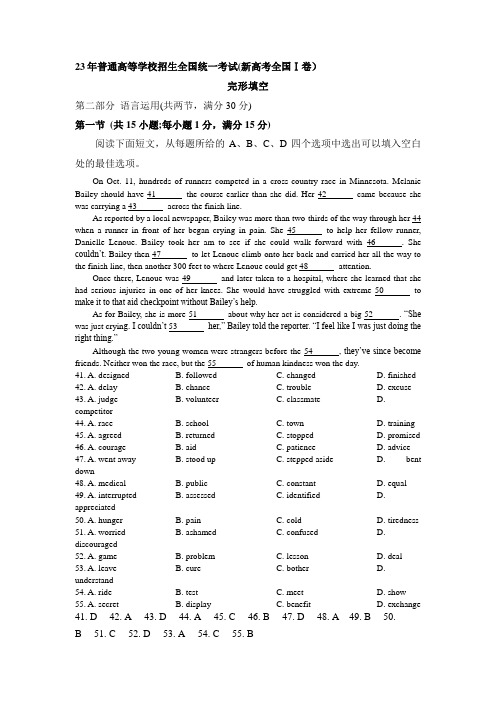
23年普通高等学校招生全国统一考试(新高考全国Ⅰ卷)完形填空第二部分语言运用(共两节,满分30分)第一节 (共15小题;每小题1分,满分15分)阅读下面短文,从每题所给的A、B、C、D四个选项中选出可以填入空白处的最佳选项。
On Oct. 11, hundreds of runners competed in a cross-country race in Minnesota. Melanie Bailey should have 41 the course earlier than she did. Her 42 came because she was carrying a 43 across the finish line.As reported by a local newspaper, Bailey was more than two-thirds of the way through her 44 when a runner in front of her began crying in pain. She 45 to help her fellow runner, Danielle Lenoue. Bailey took her am to see if she could walk forward with 46 . She couldn’t. Bailey then 47 to let Lenoue climb onto her back and carried her all the way to the finish line, then another 300 feet to where Lenoue could get 48 attention.Once there, Lenoue was 49 and later taken to a hospital, where she learned that she had serious injuries in one of her knees. She would have struggled with extreme 50 to make it to that aid checkpoint without Bailey’s help.As for Bailey, she is more 51 about why her act is considered a big 52 . “She was just cryin g. I couldn’t 53 her,” Bailey told the reporter. “I feel like I was just doing the right thing.”Although the two young women were strangers before the 54 , they’ve since become friends. Neither won the race, but the 55 of human kindness won the day.41. A. designed B. followed C. changed D. finished42. A. delay B. chance C. trouble D. excuse43. A. judge B. volunteer C. classmate D. competitor44. A. race B. school C. town D. training45. A. agreed B. returned C. stopped D. promised46. A. courage B. aid C. patience D. advice47. A. went away B. stood up C. stepped aside D. bent down48. A. medical B. public C. constant D. equal49. A. interrupted B. assessed C. identified D. appreciated50. A. hunger B. pain C. cold D. tiredness51. A. worried B. ashamed C. confused D. discouraged52. A. game B. problem C. lesson D. deal53. A. leave B. cure C. bother D. understand54. A. ride B. test C. meet D. show55. A. secret B. display C. benefit D. exchange 41. D 42. A 43. D 44. A 45. C 46. B 47. D 48. A 49. B 50.B 51.C 52.D 53. A 54. C 55. B【解析】01考点分析动词5个,动词短语1个,形容词2个,名词7个难度系数:中等字数:226题号词性考点41. 动词考查动宾搭配finish the course42 名词考查名词辨析delay“延迟”43 名词考查语义场词汇同现 competitor44 名词考查原词重现race45 动词考查动词用法stop to do sth. 停下来做某事46 名词考查名词aid含义“援助”47 动词短语考查动词短语辨析bend down 弯腰48 形容词考查形容词词义medical49 动词考查动词辨析assess“评估”50 名词考查名词含义pain“疼痛”51 形容词考查形容词词义 confused “困惑的”52 名词考查名词词义deal“事情”53 动词考查动词含义leave sb.留下某人54 名词考查名词含义meet“见面”55 名词考查名词含义 display “展示”本文解题的关键是要抓住故事的发展脉络文章结构分析:第一段:交代故事发生的时间、地点和事件。
2023年新高考1卷英语完形填空解析
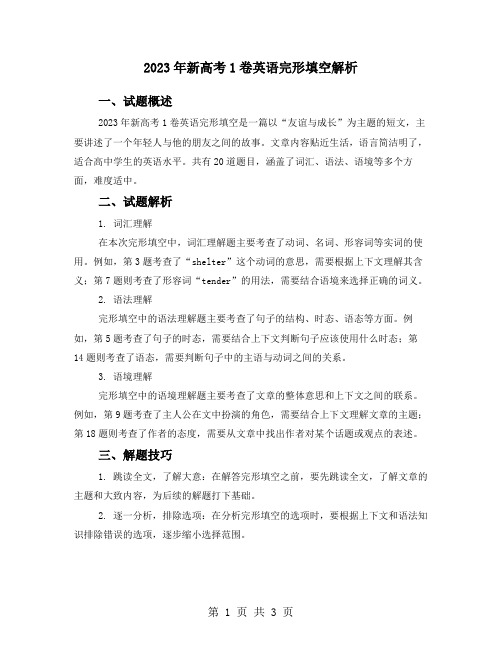
2023年新高考1卷英语完形填空解析一、试题概述2023年新高考1卷英语完形填空是一篇以“友谊与成长”为主题的短文,主要讲述了一个年轻人与他的朋友之间的故事。
文章内容贴近生活,语言简洁明了,适合高中学生的英语水平。
共有20道题目,涵盖了词汇、语法、语境等多个方面,难度适中。
二、试题解析1. 词汇理解在本次完形填空中,词汇理解题主要考查了动词、名词、形容词等实词的使用。
例如,第3题考查了“shelter”这个动词的意思,需要根据上下文理解其含义;第7题则考查了形容词“tender”的用法,需要结合语境来选择正确的词义。
2. 语法理解完形填空中的语法理解题主要考查了句子的结构、时态、语态等方面。
例如,第5题考查了句子的时态,需要结合上下文判断句子应该使用什么时态;第14题则考查了语态,需要判断句子中的主语与动词之间的关系。
3. 语境理解完形填空中的语境理解题主要考查了文章的整体意思和上下文之间的联系。
例如,第9题考查了主人公在文中扮演的角色,需要结合上下文理解文章的主题;第18题则考查了作者的态度,需要从文章中找出作者对某个话题或观点的表述。
三、解题技巧1. 跳读全文,了解大意:在解答完形填空之前,要先跳读全文,了解文章的主题和大致内容,为后续的解题打下基础。
2. 逐一分析,排除选项:在分析完形填空的选项时,要根据上下文和语法知识排除错误的选项,逐步缩小选择范围。
3. 结合语境,选择最佳答案:完形填空的答案往往不是唯一的,但每个选项在某些情况下可能是正确的。
因此,在选择答案时,要结合语境,选择最符合文章意思的答案。
4. 复读全文,验证答案:在完成所有选择题后,要复读全文,检查答案是否符合文章意思和逻辑。
如果有不妥之处,要及时更正。
四、参考答案及解析1. A:根据后文“a little while later”可知此处表示时间上的先后顺序,因此选A,“后来”。
2. C:根据下文提到的“befriended”可知此处是在描述他与小狗建立友谊的过程,因此选C,“喜欢”。
高考英语完型知识点
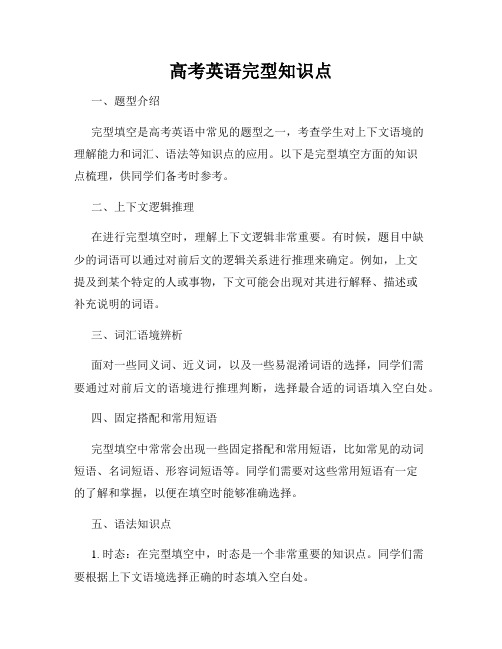
高考英语完型知识点一、题型介绍完型填空是高考英语中常见的题型之一,考查学生对上下文语境的理解能力和词汇、语法等知识点的应用。
以下是完型填空方面的知识点梳理,供同学们备考时参考。
二、上下文逻辑推理在进行完型填空时,理解上下文逻辑非常重要。
有时候,题目中缺少的词语可以通过对前后文的逻辑关系进行推理来确定。
例如,上文提及到某个特定的人或事物,下文可能会出现对其进行解释、描述或补充说明的词语。
三、词汇语境辨析面对一些同义词、近义词,以及一些易混淆词语的选择,同学们需要通过对前后文的语境进行推理判断,选择最合适的词语填入空白处。
四、固定搭配和常用短语完型填空中常常会出现一些固定搭配和常用短语,比如常见的动词短语、名词短语、形容词短语等。
同学们需要对这些常用短语有一定的了解和掌握,以便在填空时能够准确选择。
五、语法知识点1. 时态:在完型填空中,时态是一个非常重要的知识点。
同学们需要根据上下文语境选择正确的时态填入空白处。
2. 主谓一致:当主语为单数形式时,谓语动词要用单数形式;当主语为复数形式时,谓语动词要用复数形式。
3. 名词单复数:根据上下文语境和逻辑关系,判断需要填入的名词应该是单数形式还是复数形式。
4. 代词指代:当句中出现代词时,要清楚代词所指代的具体对象是什么,以避免产生歧义。
六、全面复习同学们在备考时要全面复习完型填空所涉及的各个知识点,同时多进行模拟练习,在解题过程中加深对知识点的理解和应用。
通过不断练习,提高解题速度和准确性,为高考顺利发挥水平做好充分准备。
七、总结完型填空是一项需要对语言的词汇、语法等各个方面有全面了解和掌握的考察项目。
通过对上下文逻辑推理、词汇语境辨析、固定搭配和常用短语的掌握,以及对语法知识点的熟练运用,同学们可以在高考中取得更好的成绩。
因此,大家要在备考中重视和加强对完型填空知识点的学习和掌握。
希望同学们能在高考中取得满意的成绩!。
超实用2023年高考真题完形填空分析(全国新高考1卷)课件全

her back and carried her all the way to the finish line, then another 300 feet to where
Lenoue could get 48adj. attention.
Once there, Lenoue was 49v. and later taken to a hospital, where she learned
Once there, Lenoue was 49 and later taken to a hospital, where she learned that she had serious injuries in one of her knees. She would have struggled with extreme 50 to make it to that aid checkpoint without Bailey’s help.
3、复现关系: ① 原词复现 ② 统筹词复现:统一范畴/同一类 ③ 反义词复现 ④ 代词复现:空格附近有代词,往前找指代对象!
4、动词: ① 注意动作的发出者(尤其多人物) ② 记叙文=动作+动作 eg: --动作的顺序!
5、前后逻辑: ① 连词:because/although/unless ② 连接性副词:however/besides/instead
the way She v.45
to help her fellow runner, Danielle Lenoue. Bailey took her arm to see if she could
walk forward with 46 . She couldn’t. Bailey then 47v. to let Lenoue climb onto
高考英语完型填空技巧知识点
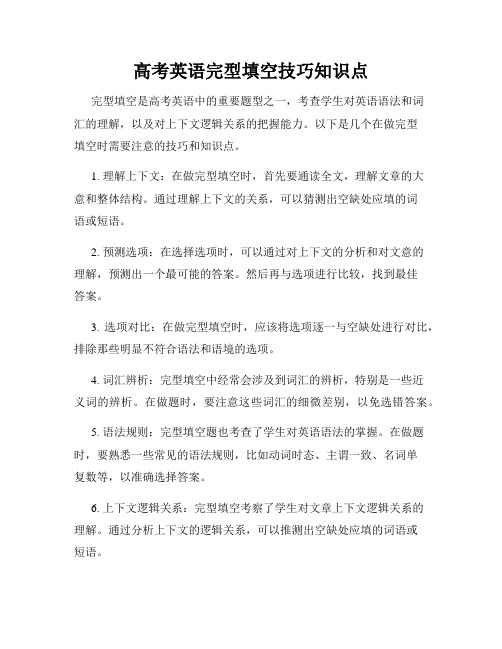
高考英语完型填空技巧知识点完型填空是高考英语中的重要题型之一,考查学生对英语语法和词
汇的理解,以及对上下文逻辑关系的把握能力。
以下是几个在做完型
填空时需要注意的技巧和知识点。
1. 理解上下文:在做完型填空时,首先要通读全文,理解文章的大
意和整体结构。
通过理解上下文的关系,可以猜测出空缺处应填的词
语或短语。
2. 预测选项:在选择选项时,可以通过对上下文的分析和对文意的
理解,预测出一个最可能的答案。
然后再与选项进行比较,找到最佳
答案。
3. 选项对比:在做完型填空时,应该将选项逐一与空缺处进行对比,排除那些明显不符合语法和语境的选项。
4. 词汇辨析:完型填空中经常会涉及到词汇的辨析,特别是一些近
义词的辨析。
在做题时,要注意这些词汇的细微差别,以免选错答案。
5. 语法规则:完型填空题也考查了学生对英语语法的掌握。
在做题时,要熟悉一些常见的语法规则,比如动词时态、主谓一致、名词单
复数等,以准确选择答案。
6. 上下文逻辑关系:完型填空考察了学生对文章上下文逻辑关系的
理解。
通过分析上下文的逻辑关系,可以推测出空缺处应填的词语或
短语。
7. 多读多练:要想在完型填空题上得到高分,需要进行大量的练习,并且多读一些英语文章,培养自己的语感和理解能力。
以上是高考英语完型填空的一些技巧和知识点,希望对你有帮助。
记住,在做题时要认真阅读题目和选项,理解文章的意思,通过分析
上下文的逻辑关系和对选项的对比,选择最佳答案。
多多练习,提高
自己的英语水平。
2024高考英语完形填空知识点清单与技巧总结
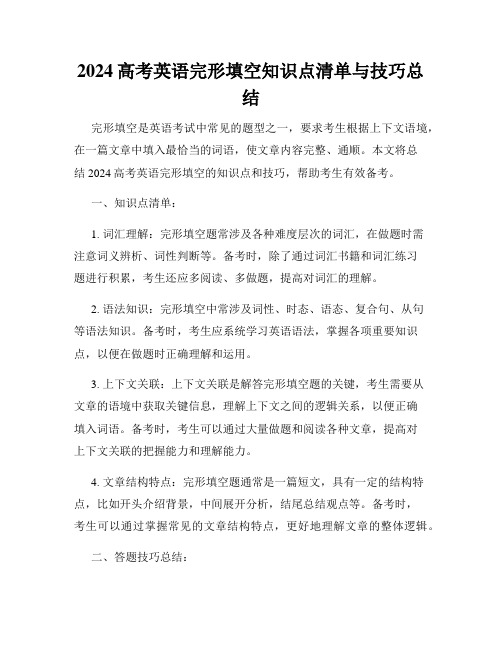
2024高考英语完形填空知识点清单与技巧总结完形填空是英语考试中常见的题型之一,要求考生根据上下文语境,在一篇文章中填入最恰当的词语,使文章内容完整、通顺。
本文将总结2024高考英语完形填空的知识点和技巧,帮助考生有效备考。
一、知识点清单:1. 词汇理解:完形填空题常涉及各种难度层次的词汇,在做题时需注意词义辨析、词性判断等。
备考时,除了通过词汇书籍和词汇练习题进行积累,考生还应多阅读、多做题,提高对词汇的理解。
2. 语法知识:完形填空中常涉及词性、时态、语态、复合句、从句等语法知识。
备考时,考生应系统学习英语语法,掌握各项重要知识点,以便在做题时正确理解和运用。
3. 上下文关联:上下文关联是解答完形填空题的关键,考生需要从文章的语境中获取关键信息,理解上下文之间的逻辑关系,以便正确填入词语。
备考时,考生可以通过大量做题和阅读各种文章,提高对上下文关联的把握能力和理解能力。
4. 文章结构特点:完形填空题通常是一篇短文,具有一定的结构特点,比如开头介绍背景,中间展开分析,结尾总结观点等。
备考时,考生可以通过掌握常见的文章结构特点,更好地理解文章的整体逻辑。
二、答题技巧总结:1. 首先通读全文:在开始做题之前,考生应先通读全文,了解文章的大意和主题,抓住文章的脉络和结构。
2. 推测上下文:在做题时,先尝试根据上下文的逻辑关系猜测空格处应填入的词语。
通过理解上下文的线索,可以初步缩小选项范围。
3. 定位关键信息:在做题时,特别要注意定位关键信息,即可以直接确定空格处应填入词语的线索。
可以通过词性、语法结构、上下文关联等方面来确定正确答案。
4. 避免干扰选项:在选择答案时,要注意避免被干扰选项所迷惑。
干扰选项通常会使用与文章内容相关但又与上下文线索不符的词语,考生需要通过理解文章整体逻辑,排除干扰选项。
5. 重点处理难题:在做题过程中,遇到较难的题目可以先跳过,先解决其他相对简单的题目,然后再回过头来处理难题。
2023高考英语新高考II卷完形填空全考点解析附译文

2023高考英语新高考II卷完形填空全考点解析附译文[名校内部资料]第一节(共15小题;每小题1分,满分15分)阅读下面短文,从每题所给的A、B、C、D四个选项中选出可以填入空白处的最佳选项。
In April last year, I saw a post on the PNP (Pilots N Paws) website from a family in Topeka. They had to move to Virginia but they were on a very tight 41 . They could not afford to pay for 42 for their dog, Tiffy, and 43 wanted to take her with them.It just 44 that I was planning another PNP flight with another pilot, Karen, who 45 to take Tiffy from Kansas City to Virginia. What I was to do was fly to Topeka to 46 Tiffy.When I met Tiffy’s owners, they seemed very 47 . George, the husband, was trying to be calm, but I could tell this was 48 for him, having to leave his dog to a 49 and trust that everything would 50 .After some goodbyes, I asked George and his wife to help me 51 Tiffy into the plane. I promised to take care of Tiffyand 52 them as soon as we got to Kansas City.The flight was 53 , and Tiffy was a great passenger. The next day, she 54 with Karen and made it back to George in Virginia within a few days. He was so 55 and sent me a nice e-mail with pictures. It felt great to know that I had helped bring this family together again.41. A. turn B. budgetC. scheduleD. connection42. A. food B. shelterC. medicineD. transportation43. A. desperately B. temporarilyC. secretlyD. originally44. A. appeared B. provedC. happenedD. showed45. A. waited B. offeredC. hurriedD. failed46. A. see off B. look forC. hand overD. pick up47. A. confused B. nervousC. annoyedD. curious48. A. hard B. fineC. commonD. lucky49. A. coworker B. passengerC. strangerD. neighbor50. A. speed up B. work outC. come backD. take off51. A. feed B. followC. changeD. load52. A. call B. joinC. leaveD. serve53. A. unnecessary B. unexpectedC. unavoidableD. uneventful54. A. returned B. foughtC. flewD. agreed55. A. thankful B. generousC. proudD. sympathetic参考答案:41-45 BDACB 46-50 DBACB 51-55 DADCA文章主旨:本文是一篇记叙文,讲述了作者和另外一位飞行员通过PNP计划帮助一家人把宠物狗从托皮卡运送到弗吉尼亚的故事。
高考英语完形填空技巧讲解(共23张PPT)

a small house. She 1 John very
much. In her eyes he couldn’t do
anything 2 ….
1.A. depended on B. waited on
C. trusted
D. loved
2. A. wrong
B. great
C. good
D. strange
三.运用习惯搭配,辨析词义, 熟悉常见句型
完形填空的四个备选项,往往和空格前 后的单词形成某种搭配。首先要注意词义深 层内涵的区别。动词的搭配出现的尤其多, 往往涉及到动词与名词、介词或副词的搭配。
例4 “I grew up on a hundred- acre farm and had only cats 37 playmates” Kruger, the seventy-year-old man, says. “My hearing was damaged by the 38 noise of farm equipment, so I learned to connect with 39 animals. They react to what they see and what you do.” 37. A. like B. as C. except D. among
完形填空
How to do cloze tests?
做完形的时候你有以下问题吗?
1.烦 2.慢 3.错 4.不得不做,硬着头皮做,还是
错
出题者的初衷
完形填空考查的是对学生的综 合语言运用能力,但是每一个空 格的设置并不是随心所欲的,命 题人主要通过上下文暗示出的某 种信息来保证答案的正确性和 唯一性。考生应该通过上下文的 暗示获取解题信息,留意暗送的 “秋波”,也就是:关键词
高考完形填空知识点

高考完形填空知识点完形填空是高考英语试卷中的常见题型之一,考察学生对词汇、语法以及阅读理解的综合运用能力。
下面将介绍一些高考完形填空的知识点,帮助考生提高解题技巧。
1. 阅读全文:在开始解答题目之前,先通读全文,获取整篇文章的主题和大意,了解文章的结构和逻辑关系,这有助于回答具体题目时能够更好地理解上下文。
2. 猜词义:遇到不认识的单词时,可以通过上下文的线索来猜测其意思。
注意词的前后文逻辑关系以及词的词性和含义,在上下文中找到合适的词义来填空。
3. 词形变化:有时候需要根据上下文中的语法和意思要求,将单词作适当的词形变化。
常见的词形变化包括名词、形容词、副词和动词的变化。
4. 逻辑关系:在解答题目时,需要理解文章中的逻辑关系,如因果关系、对比关系、转折关系等。
根据上下文的逻辑关系,可以更准确地推测出正确答案。
5. 上下文指代:注意上下文中的代词和指示词,它们常常指向某个特定的名词,理解句子之间的关系有助于确定正确的选项。
6. 语法知识:完形填空也考察学生对英语语法规则的掌握。
特别需要注意的是时态、主谓一致、动词的形式变化等语法知识,往往与正确答案密切相关。
7. 注意细节:在回答具体题目时,注意细节的描述和含义。
有时候需要仔细理解句子中的名词、动词、形容词等词语,以及字面意义和隐含意义。
8. 综合能力:完形填空是综合考察学生的词汇、语法和阅读能力的题型,需要将这些知识点综合运用在解题过程中。
因此,平时需要注重提高综合能力的培养。
以上就是高考完形填空的一些知识点,希望对考生们有所帮助。
通过了解和熟悉这些知识点,并进行积极的练习和训练,相信大家能够在高考中取得好成绩。
祝愿各位考生顺利通过高考!。
2023年高考英语1卷完形填空解析

2023年高考英语1卷完形填空解析随着2023年高考的临近,我们对于高考英语试卷的关注度也越来越高。
其中,完形填空作为英语试卷的重要组成部分,对于学生的语言运用能力和阅读理解能力都有着较高的要求。
本文将针对2023年高考英语1卷完形填空进行解析,帮助考生更好地理解题目,提高解题能力。
一、题型特点完形填空是一种考查学生语言运用能力的题型,通常包含一篇短文和多个选择题,每个选择题给出四个选项,要求学生从选项中选择最符合语境的答案。
这种题型主要考查学生的词汇、语法和阅读理解能力,同时也需要学生具备一定的逻辑推理和判断能力。
二、解题技巧1. 通读全文,了解大意:在解答完形填空时,首先要快速浏览全文,了解文章大意,注意文中的关键词和关键句,把握文章的结构和脉络。
2. 结合语境,逐一分析:在了解了文章大意后,要结合每个空格的前后文,考虑所填空格与空格前后词语的逻辑关系,再根据选项中提供的词语进行分析和判断。
3. 排除干扰,慎重选择:在确定了所填空格与空格前后词语的逻辑关系后,再结合自己的语言知识,排除明显不符合语境的选项,最终确定正确的答案。
4. 复查答案,确保准确:在完成所有选择题后,要对答案进行复查和核对,确保答案的准确性和合理性。
三、真题解析以下是2023年高考英语1卷完形填空的真题解析:原文:When I was a kid, my mom always said, “You can be __36__ if you try hard enough.”解析:在原文中,“You can be __36__ if you try hard enough”这句话表达了一种积极向上的态度,鼓励人们通过努力实现自己的梦想。
因此,根据语境和常识,我们可以推断出空格处应该填入一个表示“成功”或“成就”的词。
而在选项中,“achieve”表示取得成功或成就,符合语境和常识,因此是正确答案。
四、备考建议1. 多做题、多练习:通过多做题来提高自己的解题能力和速度,掌握解题技巧和方法。
高考英语完形填空常见知识点归纳
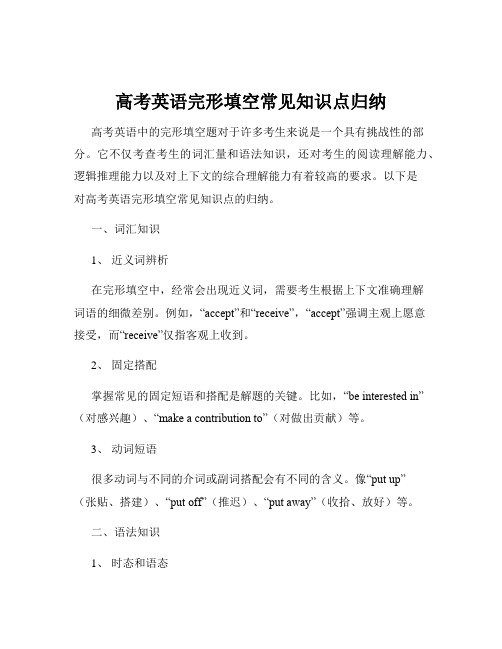
高考英语完形填空常见知识点归纳高考英语中的完形填空题对于许多考生来说是一个具有挑战性的部分。
它不仅考查考生的词汇量和语法知识,还对考生的阅读理解能力、逻辑推理能力以及对上下文的综合理解能力有着较高的要求。
以下是对高考英语完形填空常见知识点的归纳。
一、词汇知识1、近义词辨析在完形填空中,经常会出现近义词,需要考生根据上下文准确理解词语的细微差别。
例如,“accept”和“receive”,“accept”强调主观上愿意接受,而“receive”仅指客观上收到。
2、固定搭配掌握常见的固定短语和搭配是解题的关键。
比如,“be interested in”(对感兴趣)、“make a contribution to”(对做出贡献)等。
3、动词短语很多动词与不同的介词或副词搭配会有不同的含义。
像“put up”(张贴、搭建)、“put off”(推迟)、“put away”(收拾、放好)等。
二、语法知识1、时态和语态通过上下文判断句子的时态和语态。
例如,如果前文是过去时,那么在填空时就要注意所填动词的时态也要是过去的某种形式。
2、非谓语动词包括动名词、不定式和分词。
要理解它们在句子中的作用和用法,比如动名词作主语、不定式作目的状语等。
3、从句定语从句、状语从句和名词性从句在完形填空中经常出现。
要熟悉各类从句的引导词和用法。
三、上下文逻辑关系1、转折关系常见的转折词有“but”“however”“yet”等。
当出现这些词时,前后文的意思往往相反。
2、因果关系“because”“so”“since”“as a result”等词表明因果关系,要根据因果逻辑来选择合适的答案。
3、并列关系“and”“also”“as well as”等表示并列,所填的词要与并列的部分在语义和形式上保持一致。
四、文化背景知识高考完形填空有时会涉及到英语国家的文化、习俗等背景知识。
例如,某些节日的庆祝方式、特定的社交礼仪等。
了解这些知识有助于更好地理解文章的含义。
高考英语完形填空技巧讲解
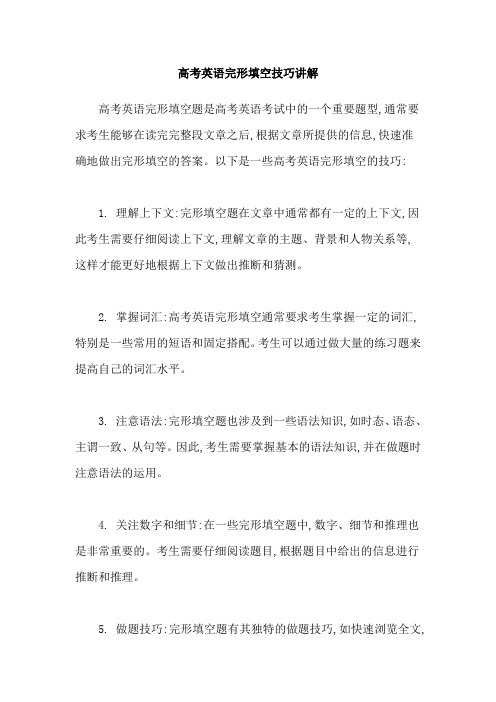
高考英语完形填空技巧讲解
高考英语完形填空题是高考英语考试中的一个重要题型,通常要求考生能够在读完完整段文章之后,根据文章所提供的信息,快速准
确地做出完形填空的答案。
以下是一些高考英语完形填空的技巧:
1. 理解上下文:完形填空题在文章中通常都有一定的上下文,因此考生需要仔细阅读上下文,理解文章的主题、背景和人物关系等,
这样才能更好地根据上下文做出推断和猜测。
2. 掌握词汇:高考英语完形填空通常要求考生掌握一定的词汇,特别是一些常用的短语和固定搭配。
考生可以通过做大量的练习题来提高自己的词汇水平。
3. 注意语法:完形填空题也涉及到一些语法知识,如时态、语态、主谓一致、从句等。
因此,考生需要掌握基本的语法知识,并在做题时注意语法的运用。
4. 关注数字和细节:在一些完形填空题中,数字、细节和推理也是非常重要的。
考生需要仔细阅读题目,根据题目中给出的信息进行推断和推理。
5. 做题技巧:完形填空题有其独特的做题技巧,如快速浏览全文,
注意转折、结尾等关键部分的语句,注意上下文的联系等。
考生可以通过练习来提高做题技巧。
高考英语完形填空需要一定的阅读和推理能力,同时需要掌握一些基本的语法和词汇知识。
通过多做练习题和练习技巧,考生可以提高完形填空题的得分。
2023高考英语甲卷完形填空篇深度解析
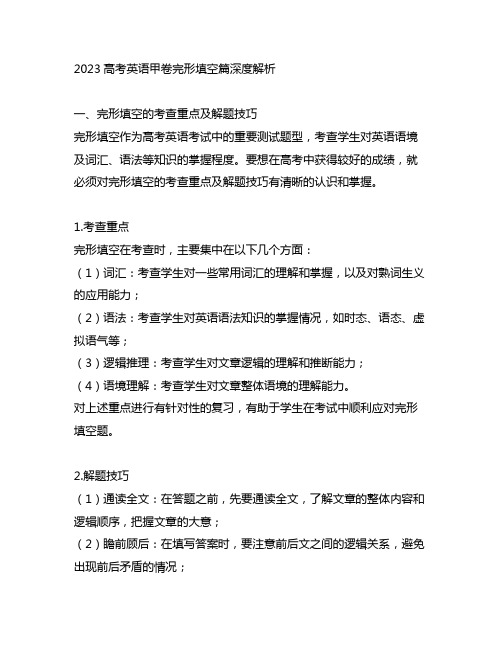
2023高考英语甲卷完形填空篇深度解析一、完形填空的考查重点及解题技巧完形填空作为高考英语考试中的重要测试题型,考查学生对英语语境及词汇、语法等知识的掌握程度。
要想在高考中获得较好的成绩,就必须对完形填空的考查重点及解题技巧有清晰的认识和掌握。
1.考查重点完形填空在考查时,主要集中在以下几个方面:(1)词汇:考查学生对一些常用词汇的理解和掌握,以及对熟词生义的应用能力;(2)语法:考查学生对英语语法知识的掌握情况,如时态、语态、虚拟语气等;(3)逻辑推理:考查学生对文章逻辑的理解和推断能力;(4)语境理解:考查学生对文章整体语境的理解能力。
对上述重点进行有针对性的复习,有助于学生在考试中顺利应对完形填空题。
2.解题技巧(1)通读全文:在答题之前,先要通读全文,了解文章的整体内容和逻辑顺序,把握文章的大意;(2)瞻前顾后:在填写答案时,要注意前后文之间的逻辑关系,避免出现前后矛盾的情况;(3)留意选项:要仔细审题,留意选项之间的差异和文章语境的契合程度,避免被一些相似但不符合语境的选项所迷惑;(4)做到不死抠:如果有一些生词或生句难以理解,不要死抠,可以通过上下文进行推测。
以上是完形填空的考查重点及解题技巧,希望考生们可以认真复习并灵活运用这些技巧,以应对2023高考英语甲卷中的完形填空题。
二、常见易错知识点及应试技巧完形填空题中的知识点涉及到英语的各个方面,以下列举了一些常见易错知识点及应试技巧,希望考生们能够引起重视,加强复习。
1.词汇辨析完形填空题中常常考查学生对一些词汇的辨析能力,例如词义辨析、词性辨析等。
对于这类知识点,考生们要注意以下几点:(1)熟记常见的同义词和反义词,以便在填空时做出正确选择;(2)注意词性转换,在理解词义的基础上,学会将一个词在句中不同的词性进行转换;(3)通过大量阅读积累词汇,提高词汇辨析能力。
2.语法知识完形填空中的语法知识也是考生们容易出现错误的地方,主要涉及到时态、语态、虚拟语气等方面。
高考英语完形填空知识点
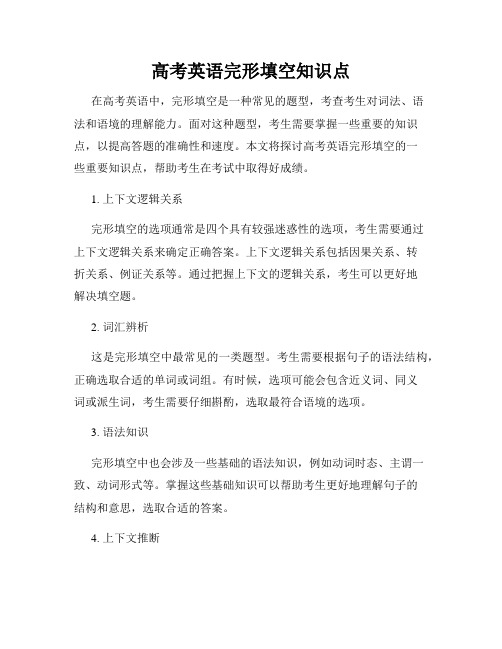
高考英语完形填空知识点在高考英语中,完形填空是一种常见的题型,考查考生对词法、语法和语境的理解能力。
面对这种题型,考生需要掌握一些重要的知识点,以提高答题的准确性和速度。
本文将探讨高考英语完形填空的一些重要知识点,帮助考生在考试中取得好成绩。
1. 上下文逻辑关系完形填空的选项通常是四个具有较强迷惑性的选项,考生需要通过上下文逻辑关系来确定正确答案。
上下文逻辑关系包括因果关系、转折关系、例证关系等。
通过把握上下文的逻辑关系,考生可以更好地解决填空题。
2. 词汇辨析这是完形填空中最常见的一类题型。
考生需要根据句子的语法结构,正确选取合适的单词或词组。
有时候,选项可能会包含近义词、同义词或派生词,考生需要仔细斟酌,选取最符合语境的选项。
3. 语法知识完形填空中也会涉及一些基础的语法知识,例如动词时态、主谓一致、动词形式等。
掌握这些基础知识可以帮助考生更好地理解句子的结构和意思,选取合适的答案。
4. 上下文推断有时候,上下文并没有直接给出答案,考生需要通过推断来填写空白处。
这就要求考生有良好的阅读理解能力和推理能力。
通过对上下文的内容和逻辑进行分析,考生可以推导出正确的答案。
5. 固定搭配在完形填空中,经常会涉及到一些固定搭配,例如动词与介词的搭配、形容词与名词的搭配等。
考生需要牢记这些固定搭配,对于选项中的词组能够迅速辨别其正确与否。
6. 修辞手法完形填空中也会出现一些修辞手法,例如比喻、夸张、反问等。
考生需要通过对这些修辞手法的理解,准确选择答案。
7. 长难句理解完形填空中常常会涉及到一些长难句,对于这些句子,考生需要耐心细读,理清句子的结构和意思,找出答案所在。
以上是高考英语完形填空的一些重要知识点。
考生在备考中应该注重词汇和语法的积累,加强阅读理解和推理能力的训练。
另外,做题时要注重细节的把握和推理的灵活运用,辨析选项之间的差异并做出正确的选择。
只有通过大量的练习和积累,考生才能更好地掌握这些知识点,提高答题的准确性和速度。
高考英语 完形填空 讲解 10篇 (含答案)

完形填空完形填空是一种旨在测试学生英语语言综合运用能力的填空补缺式障碍性阅读。
它以语篇信息为基础,以中心脉络为主线给学生提供解题信息。
主要考查学生的英语基础知识和语言运用能力,包括词汇辨析能力、分析判断能力、逻辑推理能力和跨文化交际能力。
是一种集知识和能力于一体,立意新、要求高的综合性语言测试题。
同时也是高考试题中要求最高、难度最大的一种题型。
近年来,高考完形填空在体裁上以记叙文、夹叙夹议文为主,有时也会出现说明文和议论文。
记叙文类完形填空是高考中出现频率很高的一类,是高考完形填空中的重要体裁。
记叙文是记人、叙事、写景、状物的文章,有其鲜明的特点。
这些特点构成了记叙文写作的基本要素,例如时间、地点、事件的发展、高潮和结局。
记叙文完形填空素材的选择通常会注重语言材料的思想性、知识性和时代性,语言材料会突出对情感态度、文化意识的渗透,突出其“励志性”和“教育性”,反映主流价值观,彰显正能量。
夹叙夹议类完形填空是近几年高考经常涉及的一类体裁。
这类完形填空的特点是篇幅略长,思路跳跃性强。
记叙和议论在文中交错运用。
有的是以议论引出记叙;有的是在记叙的基础上发表议论。
夹叙夹议文的主题明确,或告诉读者一个道理,或引人思考,或给人乐趣。
夹叙夹议文完形填空突出考查考生对语言的整体理解能力、把握主题的能力、微语境的识别能力、逻辑推理判断能力及对语言的感悟能力。
一般来说,文章记叙的内容积极向上、情节曲折动人、富有知识性和趣味性;文章的议论部分是记叙的升华,兼具教育性和启发性。
这类完形填空重在描述事件或描写人物,因此要完成此类完形填空需要掌握以下几个基本的解题思路:1.了解作者所叙述的故事的四大要素,即:时间(when)、地点(where)、人物(who)、原因(why),以便对文章进行定位,达到全景化理解故事的目的。
2.注意作者写作的逻辑顺序。
根据故事的不同特点,作者在写作时会采用不同的叙述方式。
有顺叙、倒叙和插叙三种方式。
高考完形填空题型解析

高考完形填空题型解析一、题型介绍完形填空是高考英语中的一个常见题型,考察学生对文章的整体理解能力和对单词和短语的理解能力。
这类题目一般考查的是上下文语境的理解和推测能力。
二、题目结构完形填空题通常由一篇短文和若干空格组成,短文中标有对应空格的数字或字母。
考生需要选择最佳答案填入空格处,使得整篇短文通顺连贯,内容完整。
选项一般是词和短语。
三、解题策略1. 阅读全文先读完整篇文章,快速了解文章的大意和基本语境。
2. 理解上下文根据文章的上下文来推测空格应填写的词语。
可以通过上文和下文的逻辑关系、词语和短语的语义表达等来确定最佳答案。
3. 排除干扰项通过观察选项之间的差异,排除掉明显不符合上下文语境的选项,并选择最佳答案填入空格。
四、常见考点1. 词汇理解考查对词汇的理解能力,需要通过上下文语境推测词义。
可以根据句子结构、前后文的逻辑关系等来选择合适的选项。
2. 语法知识考查对语法知识的理解和运用能力。
需要根据句子结构、时态和语态等来选择合适的选项。
3. 逻辑推理考查对文章逻辑关系的理解能力。
需要根据前后文的推理关系和逻辑顺序来选择合适的选项。
五、解题技巧1. 注意转折关系在文章中,常常会用一些转折词或连词表示不同的意思。
例如:however, but, although等。
在遇到这些词时,要注意上下文之间的转折关系,以便正确选择答案。
2. 理解修饰语文章中经常会出现修饰语,如形容词、副词等。
要注意修饰语与被修饰词的搭配关系,以选出合适的答案。
3. 根据句子结构选择答案通过分析句子的结构和语法关系,确定空格应填写的选项。
六、练习技巧1. 多做模拟题通过多做模拟题,熟悉题目要求,掌握解题技巧,提高解题速度和准确度。
2. 刻意练习有目的地选择一些自己较为薄弱的题型进行练习,加强对相关知识点的掌握和理解。
七、注意事项1. 注意文章的时态和语态根据文章所处的时态和语态来选择合适的选项。
2. 注意上下文语境通过理解上下文语境,选择合适的选项填入空格,使得整篇文章连贯通顺。
- 1、下载文档前请自行甄别文档内容的完整性,平台不提供额外的编辑、内容补充、找答案等附加服务。
- 2、"仅部分预览"的文档,不可在线预览部分如存在完整性等问题,可反馈申请退款(可完整预览的文档不适用该条件!)。
- 3、如文档侵犯您的权益,请联系客服反馈,我们会尽快为您处理(人工客服工作时间:9:00-18:30)。
高考英语完形填空讲解完形填空是一篇语义完整、层次清晰、短小精悍、上下文逻辑关系密切的文章,近年来特别强调对整体的感知和把握。
高考完形填空在整个试卷中起着承上启下的作用,它要求考生既具备综合运用语言知识的能力,又要有一定的阅读理解能力,同时还要有一定的综合思维和逻辑推理能力。
完形填空是高考的一个重点,同时也是一个难点,当然也是考生大量失分的一个环节。
高考完形填空命题有什么特点和变化?考生面对这些特点和变化如何积极备考?完形填空考查考生什么方面的能力以及如何有效解题?此文旨在帮助大家明确解题方向,拓宽解题思路。
1.高考完形填空的命题特色、变化及备考策略⑴首句不设空。
保留一个完整的提示句,以引导考生迅速有效地把握文章的基调和内容,考生需要重视和理解这个提示句,联系文章结尾,作充分不明确的理解和把握,不能一视而过,错失把握文章主旨的良机。
⑵备选答案多以实词为主,虚词为辅。
实词是指动词、名词、形容词和副词;虚词是指连词、介词和代词。
这种命题思想提高了考试难度,同时成了重要的被考指导原则及形式为内容服务的原则。
考生需要把握解题的突破口:整体把握文章信息,避免单一的语法角度解题。
⑶由从四个选项中选择一个“正确答案”过渡为选择“最佳答案”。
这在解题做答时,就有了质的变化,对考生语言能力提出了更高的要求。
考生需要辨别备选词的细微差别,依据语境联系上下文,做出更准确更确切的选择,而不仅仅是根据语法解题。
⑷突出语篇,语境选择为主,语法选择为辅。
从高考完形近几年的变化可看出,只需要依据空句本身就可以看出答案的小题只占10%到20%,需要跨越句子解题的占80%以上,解题需要纵观全篇,才能做出正确选择,这就需要考生解题时把注意力放在通篇把握上,不要做单句的理解,割裂语篇要传递的信息。
⑸短文题材向多样化发展。
从多年的高考完形来看,试题大多是叙述性文体的小故事。
随着高考英语水平的不断升级,完形填空已经突破了单一的叙述性文体,可能在叙述文体为主的情况下,说明文、甚至议论文和描述性说明文体,或者向突出细节描写,刻画人物内心描写,夹叙夹议等方向发展。
因此考生要关注这种变化,平时训练中要做多样化的试题,要做到有的放失。
提出这五种命题特色和变化,目的在于考生对高考完形有一个整体的把握和认识,启发大家要更新观念,改进固有的学习习惯和解题思路,真正在完形填空这一难点上有所突破和创新。
2. 高考完形填空考查能力的角度:高考完形填空通常从五个角度考查考生的语言能力,即:⑴词义辨析型⑵固定搭配和常用短语型⑶利用上下文进行逻辑推断型⑷语境型⑸利用文化背景和文化常识推断型。
1. 词义辨析型⑴定义:重点考查考生对英语实词的意义和用法的掌握,尤其是对近义词或短语在具体语境中词义范围、程度、感情色彩等方面区别的准确把握。
⑵命题分析:例1.As I drove my blue Buick into the garage, I saw that a yellow Oldsmobile was 21 too close to my space. I had to drive back and forth to get my car into the 22 space. That left 23 enough room to open the door.21. A. driven B. parked C. stopped D. stayed (park强调停的状态,stop强调停的动作)22. A. complete B. close C. narrow D. fixed (fixed是固有的,误选D就简单化,缺乏语境.C)23. A. quite B. nearly C. seldom D. hardly (表达一个否定的意义,只有D符合。
)例2. they wanted to make as much ( 37 noise ) as possible to force ( 38 the government officials ) to realize what everybody was having to 39 .39. A. stand B. accept C. know D. share (B是主动接受,A是被动忍受)⑶解题认识:词义辨析往往需要借助于语境和上下文的逻辑关系进行判断,而不是单纯的考查词义的区别。
对于常用的实词多义要加强积累,不能停留在仅仅掌握基本词义上面。
2. 固定搭配和常用短语型⑴定义:主要考查动词、名词、形容词等在句中与其它词的灵活搭配以及常见的固定短语。
⑵例题分析:Hidden passengers traveling in ships, trains, or even cars can be a terrible trouble--- especially when they are insects. As for this, there is a great 36 between human beings and insects. The former37 every possible effort to avoid being discovered, while the latter quickly38 attention to themselves.15’03’’36. A. connection B. difference C. communication D. similarity (B) the former…while the latter37. A. do B. take C. make D. try (C. 固定搭配make an effort to do sth.)38. A. give B. keep C. pay D. draw (只有draw attention to 才符合语境)⑶解题认识:固定搭配的考查也往往结合语境和上下文,体现了高考“内容为重,形式为辅”的原则。
考生既要记住固定搭配和日常短语的固定形式,又要准确地把握其意义,解题过程中不能一看到熟悉的结构就不假思索地做出选择。
3. 利用上下文进行逻辑推断型⑴定义:这类题的备选选项为隐性信息,需要借助上下文相关信息(指相近或相反)和关键提示词才能做出判断。
⑵例题分析:例1. In it(the parcel) were photos of all the actors of our show, personally signed by each performers. There were also50 of the public procession (游行队伍) and fireworks in the park, taken by the front-desk in her own time after work.50. A. rules B. pictures C. handbooks D. performances (B, picture和photos构成also关系take picture) 例2. The huge mountain is called Matterhorn Mountain. Climbers had reached the top, using the southern route. But no one had ever dared to try a winter climbing up the 4 side. But now one man was daring to try the 5 route. He was Walter Bonatti, a great mountain climber from Italy.4. A. western B. eastern C. southern D. northern (关键词but和上文southern 选择D)5. A. difficult B. different C. same D. easy (A,第二个but后的一句话表明北线更难)⑶解题认识:根据上下文进行逻辑判断属于较难的考点,考生务必要善于抓住上下文的关键信息点,以及表达对等、对比关系的连接词和短语。
从意群的角度做出判断,切忌做单句理解和判断。
4. 语境性完形⑴定义:审题和解题时需要通篇考虑,整体理解。
要有整体意识,把握文章主旨、情节发展和作者思路。
⑵例题分析:Dear Laura, I just heard you tell an old story of gift giving and unselfish love in your program. You doubted that such unselfish love would happen in today’s world. Well, I’m here to give you 36I wanted to do something very 37 for my fifteen-year-old son, who has always been the prefect child. He 38 all the summer to earn enough money to buy a sued motorcycle. Then, he spent hours and hours on it until it looked almost new. I was so 39 of him that I bought him the shiniest helmet and a riding outfit.I could 40 wait for him to open up his gift. In fact, I barely slept the night before. Upon awakening, I went to the kitchen to start the coffee, tea, and morning goodies. In the living room was a beautiful keyboard with a 41 : “To my wonderful mother, all my love, your son.”36. A. hope B. advice C. support D. courage (A)37. A. polite B. similar C. special D. private (C)38. A. played B. studied C. traveled D. worked (D)39. A. sure B. fond C. proud D. confident (C)40. A. perhaps B. really C. almost D. hardly (D)41. A. note B. notice C. word D. sign (A)⑶解题认识:在解语境题型时,要善于通过抓主题句或者归纳主旨把握整个篇章的语境,以判断作者的写作目的、态度以及思想情感,以此为主线把握情节的发展;同时解题过程中要兼顾到上下文逻辑关系。
